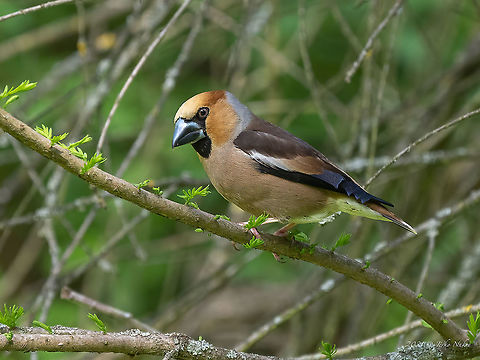
Appearance
The 16.5–18 cm long hawfinch is a bulky bull-headed bird, which appears very short-tailed in flight. Its head is orange-brown with a black eyestripe and bib, and a massive bill, which is black in summer but paler in winter. The upper parts are dark brown and the underparts orange.The white wing bars and tail tip are striking in flight. The sexes are similar.
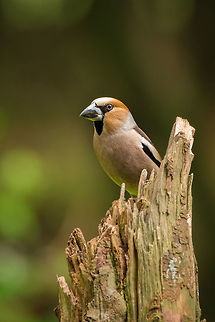
Distribution
The hawfinch is distributed in the whole of Europe, Eastern Asia, the North of Africa. It has also been sighted in Alaska, but this is reported as an accidental presence.It is not found in Iceland, parts of the British Isles, Scandinavia nor certain Mediterranean islands. It is however found in the South, such as in Spain and Bulgaria, as well as in central Europe, including parts of England and the South of Sweden.
In Asia it can be found in the Caucasus, the North of Iran, Afghanistan, Turkistan, Siberia, Manchuria and North Korea.
The hawfinch typically inhabits deciduous forests during the spring to have offspring, often in trees that bear fruit, such as oak trees. They also incur into human areas, such as parks and gardens. They can also be found in pine woods, as long as there's a source of water in the vicinity.
During autumn and winter they seek food-providing forests, especially those with cherry and plum trees. As for height, the hawfinch is present in any altitude up to that which is limited by the size of the trees.
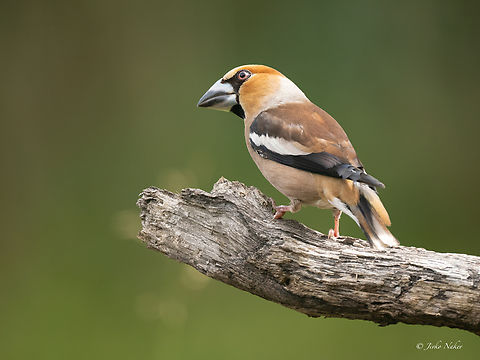
Behavior
The hawfinch is a shy species, and therefore difficult to observe and study. It spends most of the day on top of high branches, above all during breeding season. During the course of the hawfinch's life it can only be seen on the ground while looking for seeds or drinking water, always near trees.While drinking and eating it is fairly aggressive and dominant, towards both its same species or different ones, even bigger birds.
It guards a quite small territory when chicks are born, however when not bearing any offspring it is known to guard entire woods. This is interpreted as an evolutionary advantage, given colony rearing is seen as safer against nest predators.
The call is a hard "chick". The song of this unobtrusive bird is quiet and mumbled.
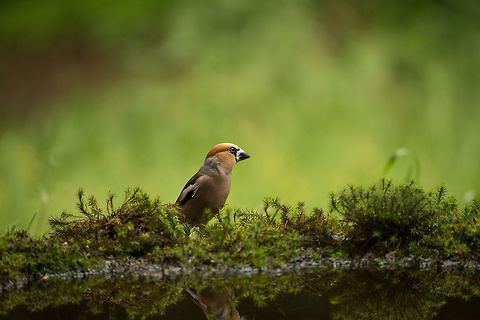
Habitat
Deciduous or mixed woodland, including parkland, with large trees - especially hornbeam - is favoured for breeding,. The hawfinch builds its nest in a bush or tree, and lays 2-7 eggs. The food is mainly seeds and fruit kernels, especially those of cherries, which it cracks with its powerful bill. This large finch species is usually seen in a pair or small group.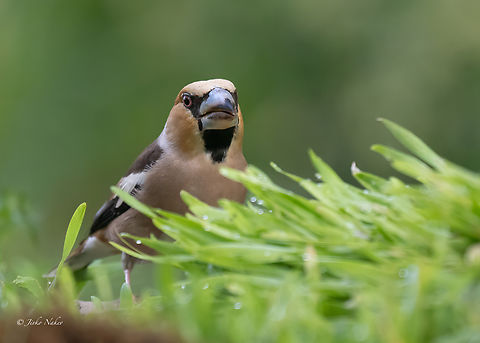
Food
The hawfinch feeds primarily on hard seeds from trees, as well as fruit seeds, which it obtains with the help of its strong beak with accompanying jaw muscles. Its jaw muscles exert a force equivalent to a load of approximately 30–48 kg. Thus it can break through the seeds of cherries and plums. Other common sources of food include pine seeds, berries, sprouts and the occasional caterpillar and beetle. They can also break through olive seeds.The bird is known to eat in groups, especially during the winter.
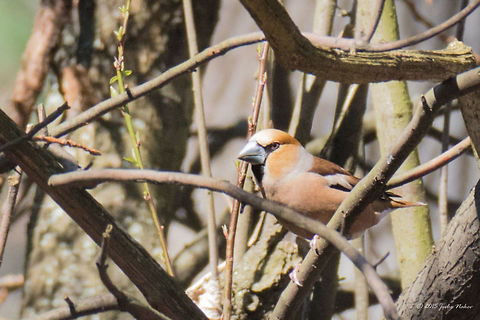
Migration
The hawfinch is a partial migrator, with Northern flocks migrating towards the South during the winter, as shown by ringing techniques. These same studies showed that those hawfinches inhabiting habitats with a temperate climate would often have sedentary behaviours.References:
Some text fragments are auto parsed from Wikipedia.